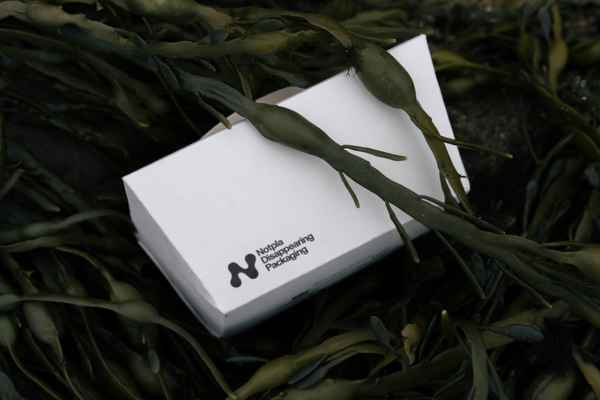The plastic forged from nature
Can materials made from seaweed and algae help humanity ditch petrochemical-based plastic?

Solutions from the natural world are serving up alternatives to the conventional plastics choking the world’s rivers and oceans.
Earthshot Prize-winner Notpla has developed a growing stable of seaweed-based packaging solutions that are winning over businesses seeking to reduce their plastic-waste footprint.
The UK-based startup has recently announced a wide-ranging partnership with Levy UK + Ireland to replace conventional food packaging at some of the world’s largest sports and entertainment venues. The collaboration is expected to amount to 75 million items over three years.
As a previous winner of the annual Earthshot Prize established by Prince William, Notpla has gained recognition for its inventive approach to plastic pollution by using one of nature’s fastest-growing resources – seaweed.
Because its products are made entirely from seaweed and plant-based materials they are home-compostable and biodegradable, recreating the functionality of plastic without the harmful environmental impact.
"Since the first introduction from Prince William and some early stadium trials, we’ve been so inspired by Levy’s dedication to reducing environmental impact."
The startup’s breakthrough liquid packaging product, the edible liquid bubble Ooho, has already replaced millions of single-use plastic items, and its product line-up also includes coated compostable food containers and an ice cream spoon made from a new material – Notpla Rigid.
Levy UK + Ireland, the sports and entertainment arm of Compass Group UK & Ireland, has already introduced carbon-labelled menus, seasonal dishes, and plant-based desserts in attempts to reduce its carbon emissions by 60 per cent.
“Since the first introduction from Prince William and some early stadium trials, we’ve been so inspired by Levy’s dedication to reducing environmental impact,” Notpla co-founder & co-CEO Pierre Paslier said.
“They truly recognise the positive effect that they can have in stopping the production of millions of items of plastic packaging and, most importantly, are taking action. That’s something to be optimistic about.”
Algae in action
Algae is the organism behind the product line up being developed by yet another bioplastic pioneer, Algenesis.
The US-based startup says the millions of tons of polyurethane produced every year for footwear, medical, and textile industries are not just accumulating landfill waste but also end up as microplastics that linger in the environment for millenia.
Late last year it secured US$5m in funding to scale its Soleic bioPolyurethane (bioPU) which is a high-performance, renewable material that its maker says is able to compost within months.
Algenesis is working with several large footwear brands including Reef to develop specific formulations of Soleic foam for commercial launch.
The startup has also created its own biodegradeble footwear brand Blueview with an upper made from a combination of Hemp, Tencel (raw material wood), eucalyptus fibres, and organic cotton, with an insole made from Soleic foam.
Wide industry scope
With possible applications across many other industries, its creator says Soleic has the capability to compete with traditional petroleum-based plastics while cutting greenhouse gas emissions by up to 50%.
The company has also partnered with Arctic Foam to create high performance and fully biodegradable surfboard blanks for shapers across the globe.
And it is forging additional partnerships to develop products using its plant-based polymers. They include coated fabrics in collaboration with coating specialist Trelleborg and mobile (cell) phone cases produced by RhinoShield.
But can it really biodegrade?
To address concerns that bioplastics may themselves contribute to microplastic pollution, a study was conducted by researchers in the Department of Chemistry and Biochemistry at the University of California San Diego in collaboration with Algenesis.
The team ground the product into fine microparticles, then applied a series of measurement tools to confirm that, when placed in compost, the material was being digested by microbes, which it said demonstrated that plant-based polymers would substantially biodegrade in under seven months.
Conventional plastics – otherwise known as petroleum-based polymers – are created from petroleum or natural gas. Bioplastics such as Notpla's range of soft and rigid plastics and Algenesis' Soleic are similar in functionality and structure but are instead produced from renewable biological sources such as algae, seaweed or mycelium and release far lower greenhouse gas emissions during production.





